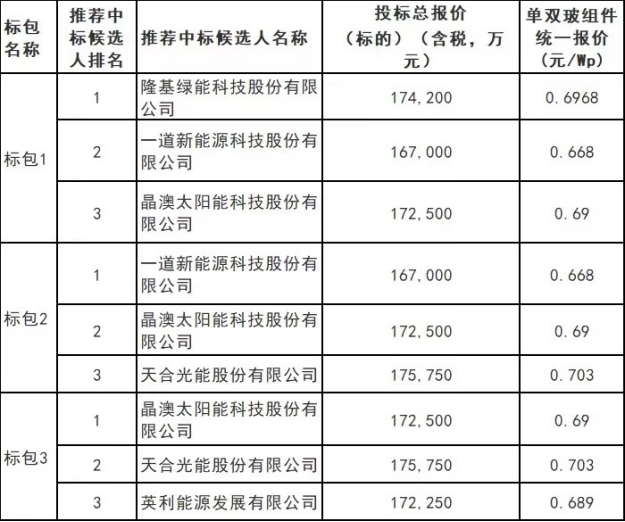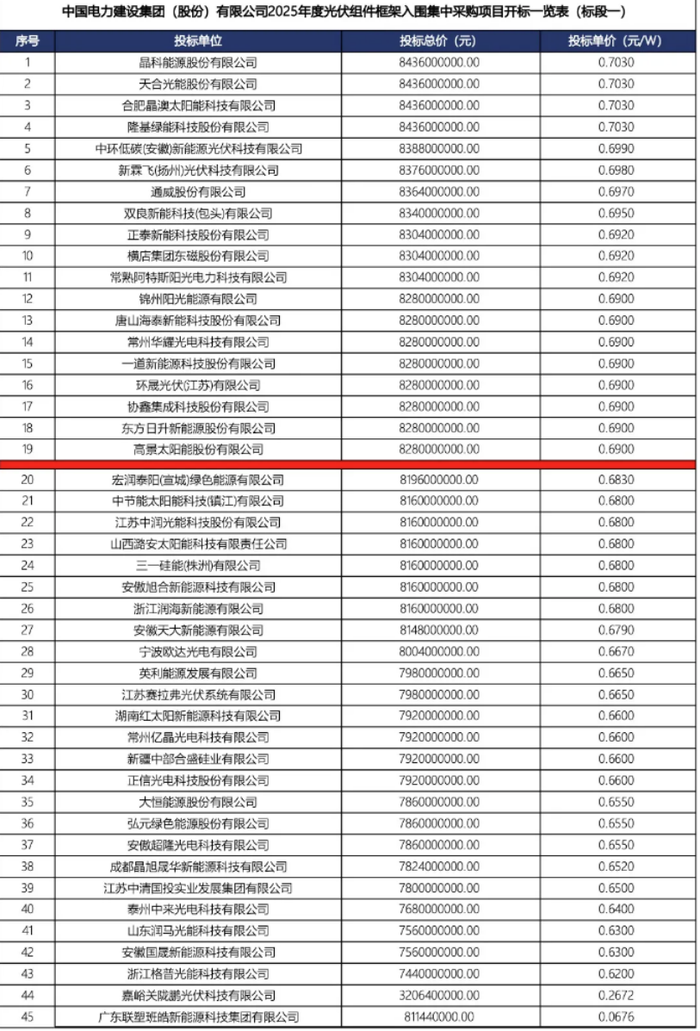Text: Alpha Factory
Just in the "largest photovoltaic bidding project in history" PowerChina (601669. SH) 51GW is full of opinions and is about to unveil the mystery, China Southern Power Grid Energy (003035. SZ) first gives a riddle.
On December 12, China Southern Power Grid Energy (003035. SZ) has announced its 2.5GW module project. A new energy was successfully shortlisted at a price of 0.668 yuan/W, which is lower than the "self-discipline cost price" of photovoltaic at 0.68 yuan/W.

Perhaps compared to the gluttonous feast of 51GW of China Power Construction, the 2.5GW of China Southern Power Grid Energy can only be regarded as an appetizer, so it has not attracted concentrated condemnation in the industry.
From the opening of the bid on November 25 to the final announcement, it took half a month. According to this time, the next 51GW module tender of PowerChina is expected to announce the winning candidates as soon as this week.
On December 9, PowerChina opened the bid for the 51GW photovoltaic module centralized procurement project, which attracted great attention from the industry.
This is a big test of the self-discipline mechanism of the photovoltaic industry. 58 PV module companies participated in the bidding, of which 20 companies quoted 0.68 yuan/W lower than the price agreed by the industry on October 18.

The bidding prices of each PV company have been disclosed. On November 13, PowerChina issued a bidding announcement for centralized procurement, if the "self-discipline cost price" of 0.68 yuan/W in October given by the photovoltaic industry association is used as the red line, all the first-line backbone enterprises in the industry will meet the standard.
Among them, Jinko (688223. SH), JA Solar (002459. SZ), Trina Solar (688599. SH), LONGi (601012. SH) The four leading module manufacturers have uniformly quoted a unit price of 0.703 yuan/W, showing their willingness to take responsibility for the healthy development of the industry and not fight an involution "price war".
However, there are still "backward enterprises" who are disobedient and fight the "line of life and death". For example, Daheng Energy, EGing Optoelectronics (600537. SZ), Yingli Energy, Hongyuan Green Energy (603185. SH) and so on, trying to grab bids at low prices.
PowerChina is a framework procurement for this project. This approach allows the purchaser to flexibly order products and services for a certain period of time, under the terms and prices agreed in the agreement, without the need for a separate bidding process each time.
Therefore, it cannot be ruled out that some companies have the secret intention of "entering the list first through low prices, and then gambling on specific prices in the subsequent performance process".
The current bid opening results are a test of the self-discipline mechanism of the photovoltaic industry, and also pose a challenge to the bidding principles of central state-owned enterprises.
After all, being shortlisted means that it is already a qualified bidder for power construction. If there is really a low price bidder successfully selected, it shows that the so-called "self-discipline" is difficult to get the support of the downstream customer central enterprise Party A, and the "industry self-discipline alliance" will also face a situation of collapse.
02 How to control "thorns"?
Whether industry self-discipline can be achieved depends fundamentally on whether the distribution of interests of various photovoltaic companies can be agreed.
Under the rules of the market economy, no enterprise is willing to sacrifice its own interests and pay for the so-called industry self-discipline.
Do not suffer from few, but suffer from unevenness. In the past, it was a normal business practice for second-tier module manufacturers to compete for bids by virtue of their own price advantages.
However, in the current atmosphere of price self-discipline, it is obviously more beneficial for PV manufacturers to advocate price limits by virtue of their shipments and brand advantages.
Assuming that the participating parties unanimously invest in the price of 0.68 yuan/w to "fly close to the ground", theoretically, the downstream central state-owned enterprise power stations will choose large factories with greater fame, more shipments and more guaranteed quality.
In addition, with the same 20% production limit, large factories can rely on inventory adjustment capabilities and relatively abundant cash flow to withstand small losses.
But for small businesses, it can mean a matter of survival or death. When people are struggling on the edge of survival, self-discipline is equivalent to "why not eat minced meat".
Some people in the industry have questioned: Is the self-discipline mechanism just a moral constraint imposed on small enterprises by leading enterprises?
In the face of those fateful super large orders that can make PV companies on the verge of bankruptcy survive in the cold winter, even if it is only a little bit, such temptation is almost impossible for small enterprises struggling to survive.
What's more, there are some "thorny" companies such as Hongyuan Green Energy that dare to challenge the authority are expanding against the trend, trying to occupy a more favorable ecological niche in the trough period of the industry.
How to control "thorns"?
According to the author's understanding from the industry, in order to allow more than 30 companies that have signed the self-discipline convention to reduce production as a whole, the photovoltaic industry association has adopted some special hard measures: enterprises participating in the production reduction must pay 100 million yuan as a deposit, and if the production reduction task is not completed, the money will be deducted accordingly, and the future may be changed to pay different amounts according to the share of production capacity.
After the opening of the bid for the power construction project, there was a discussion in the industry that in the future, the photovoltaic association may set up more stringent measures on the bid price to punish the "retrograde".
Party A's conundrum
The self-regulatory alliance of photovoltaic enterprises was previously known as the photovoltaic "OPEC". Actually, this analogy is not accurate.
The real "OPEC" in the photovoltaic industry is the downstream power stations that hold the "power of life and death" in the bidding volume, and they are the suppliers of energy. Photovoltaic manufacturing companies are more like oil and gas extraction equipment manufacturers, at best, they are shovel sellers.
The photovoltaic association "shoots" everywhere, but it is difficult to control the actions of the "five large and six small" state-owned power stations and exert effective influence. That's the headache.
As Party A, the investment and procurement model of central state-owned enterprises has always paid more attention to the initial investment cost. Its consistent bidding principle is to evaluate that Party B can deliver with quality and quantity, and "the lowest price wins".
In 2021, the polysilicon shortage led to a rapid rise in module prices. In order to maximize profits, module manufacturers have held up high-priced bid-rigging - several module manufacturers have jointly raised the bidding price, making Party A very passive.
This practice restricts market competition in the short term, resulting in higher procurement costs for bidders, and harming the interests of these central state-owned power plants.
Today, the relationship between supply and demand has reversed, and the market decision-making power is in the hands of buyers.
As Party A, PowerChina has the right to independently evaluate and purchase products, which is in line with the market-oriented mechanism, which is understandable. Judging from the bid opening results, the quotation below 0.68 yuan/W is still regarded as a valid quotation by PowerChina.
Moreover, even if Party A selects the winning bidder from the "self-discipline price" higher than RMB 0.68/W, in terms of the quotation of the four major module manufacturers at RMB 0.703/W, what criteria should Party A of the central enterprise choose and how to allocate the quota?
Low price, at least is a consensus.
The industry is clear, and the intention is good. However, the more successful coal supply-side reform began in 2016 and took four years to gradually remove backward production capacity.
In the coal industry, the proportion of state-owned enterprises is relatively high, which makes policy implementation more rapid and uniform.
However, most of the PV enterprises are private enterprises, and the government cannot directly intervene in highly market-oriented transactions, because this not only cannot solve the problem of cake distribution, but also is suspected of violating the law.
Industry associations and PV giants had hoped for a "visible hand" to come forward to coordinate, but in the end it failed.
Whoever the flowers fall to, the results will be announced soon. It is expected that as soon as this week, Power Construction will announce the winning candidates.
If PowerChina still determines the winning bidder according to the principle of "the lowest price wins", to some extent, it is not a bad thing.
The day when the visible hand and the invisible hand are held together, perhaps there will be a new world for photovoltaics. Instead of wrestling each other's wrists and pulling and jogging like now.
Source: Alpha Workshop Green
Original title: "The largest photovoltaic bidding in history" is about to be unveiled: "Self-Regulatory Alliance" is facing a life-and-death situation
Ticker Name
Percentage Change
Inclusion Date